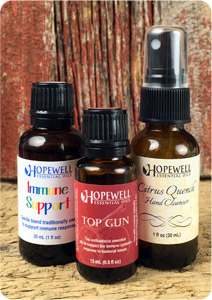Newsletters » An Effective Antibiotic Alternative

Essential Oils: An Effective Antibiotic Alternative
While antibiotics may have a place in a life-threatening situation, with antibiotic-resistant diseases on the rise, many now realize that we must guard our use of them if they are to retain their effectiveness. (Sadly, although many avoid antibiotic pharmaceuticals, they are still unwittingly exposed to antibiotics daily through dairy products and meat.)1 Our exposure to antibiotics has become a very serious issue.

Antibiotics generally work by inhibiting a single mechanism in the metabolism of an invading pathogen, and all it takes is a slight modification of the microorganism to allow the pathogen to survive, 'mutate' and begin replicating freely again, thus eventually creating a resistance to the drug. The harmful effects of antibiotic usage go beyond drug resistance. Beneficial bacteria necessary to protect us against infection and disease are lost with antibiotic use and are shown not to fully recover, thus fueling the disturbing increase in susceptibility to future infections. Martin Blaser, the author of a report in the journal Nature spoke to ABC news: "We've seen evidence that suggests antibiotics may permanently change the beneficial bacteria that we're carrying."2 Cancer has also been linked to antibiotic use.3
Essential Oils Are Fundamentally Different
Essential oils are volatile, organic chemicals that are distilled from various parts of plants, including seeds, bark, leaves, stems, roots, flowers and fruit. As highly concentrated, beneficial end-products of the plant's metabolism, communication and defense response, they can help balance and support the body to heal itself. Research has shown that many essential oils contain balancing compounds, help us fight infection and aid regeneration. Many also possess antibacterial, antifungal and antiviral properties.
Essential oil constituents are lipid soluble and relatively small, giving them the ability to easily penetrate the skin and travel throughout the body in a matter of minutes when applied topically. They can penetrate the blood-brain barrier and access the central nervous system. They have been observed to interact with various receptor sites in the brain, such as those for GABA and glutamate (Aoshima & Hamamoto, 1999: Elisabetsky et al 1999). Their lipophilic properties allow essential oils to penetrate into the sinus passageways and lungs, potentially providing numerous therapeutic effects. A single essential oil contains an extensive list of constituents, which makes it virtually impossible for a microorganism to be able to resist.
Each batch of distilled essential oil will typically be slightly, but not significantly, different even from the same botanic source and farmed in the same location from year to year. This subtle variation in essential oils makes it difficult for the bacteria to resist, and because a single essential oil is composed of a myriad of components, the bacteria are rendered impotent to repel the attack. Essential oils are particularly effective against bacteria that are 'misbehaving.' Bacteria on the internal or external skin communicate physically and chemically with other bacteria, and the essential oil seems to inhibit or disrupt that communication. Importantly, like antibacterial herbs, essential oils do not show the same propensity to harm the beneficial bacteria in the body as antibiotics do. Research in 2007 showed that some essential oils/compounds demonstrated efficacy, tolerance to low pH and selectivity towards bacterial pathogens in the intestinal tract.4
The organic world at a cellular level is amazingly complex compared to the inorganic world. There are over a million ways in which carbon can combine with hydrogen and oxygen to produce a molecule with different electrochemical properties and information. An effective organic essential oil is therefore far more difficult for the bacteria to defeat and develop resistance to than a single-molecule antibiotic.
Single molecule antibiotics work by combining with bacteria and modifying them so the body recognizes the bacteria as a pathogen and eliminates them. Sadly, this affects the good and bad bacteria, and the misbehaving bacteria fairly quickly get the idea and come up with strategies to defeat the antibiotic.

The Terrain Is Everything
While it's true that bacterial pathogens can be a dangerous reality, this should be balanced with understanding that the real issue is coming to recognize what it is that we do to weaken our intricate immune system that is designed to resist infection, and then we need to make adjustments in our daily lives that enable our bodies to resist. Microbiologist Louis Pasteur discovered that the cause of infectious disease was bacteria, but he also came to believe that "the terrain is everything and the bacterium is nothing." He recognized that bacteria only survive in specific environments and need specific conditions to reproduce.
Simple Steps to a Healthy 'Terrain'
+ Diet of wholesome, garden fresh, organically grown foods
+
Exercise, Sunshine, Sleep
+ Practice reasonable cleanliness by washing hands with soap and water (avoid chemical antibacterial soaps) and use natural sanitizers when necessary in public places.
Citrus Quench Hand Cleanser is used as one would use a hand sanitizer.
Aloe Vera Hand Sanitizer Recipe
Plague Defense Spray is used as a room spray and in public places for shopping cart handles, toilet seats, high chairs and so on.
+ Reduce Toxic Exposure in unfiltered water, cleaning products, amalgam dental fillings, root canals
+ Trust the Lord to cover what you cannot, and find your peace in Him.
+ Depending on the need, seek natural alternatives to help the fight against disease. See our Essential Oil Preparedness Chart for a list of the most common essential oils used for acute needs. Many use essential oil blends such as Immune Support, Warrior and Top Gun instead of antibiotics.
In response to possibly being exposed to an illness, my husband's grandmother would reassure us and say: "Oh, don't worry, I don't take anything that doesn't belong to me." I always felt endeared to her and inspired by her freedom to enjoy her life and hugs from others without much concern for what she might "get." If we'll focus our attention on creating a healthy "terrain,"5 our natural resistance will usually win.
Many Blessings,
Linda and the HEO crew!
___________________
References
1 Antibiotics in Your Food: What's Causing the Rise in Antibiotic-Resistant Bacteria in Our Food Supply and Why You Should Buy Antibiotic-Free Food http://thefern.org/2013/05/whats-causing-the-rise-in-antibiotic-resistant-bacteria/
2 Blaser, Dr. Martin, ABC News.
http://abcnews.go.com/Health/antibiotics-bad-good-bacteria/story?id=14374547#.UbD_4mQas5s.
3 A study conducted in 2008 of 3,000,000 people for six years showed that those who had taken 2-5 antibiotic prescriptions had a 27% increase in cancers compared to those who took none, and those who took six or more prescriptions had a 37% increase in cancers. (Int J Cancer 08;123:2152-2155)
Also, a National Cancer Institute study found that the incidence of breast cancer doubled among women who took more than 25 antibiotic prescriptions or took antibiotics for more than 500 days over a 17 year time span. (JAMA 04;291:827-835)
4 http://www.ncbi.nlm.nih.gov/pubmed/16430506 October 18-21 2007.
5 Information about improving the "terrain" may be found by exploring:
Body Ecology Diet http://bodyecology.com.
GAPS Diet www.gapsdiet.com.



1 Newsletter Comment
Thanks so much for the newsletter which is commendable in format and information.
Kathie